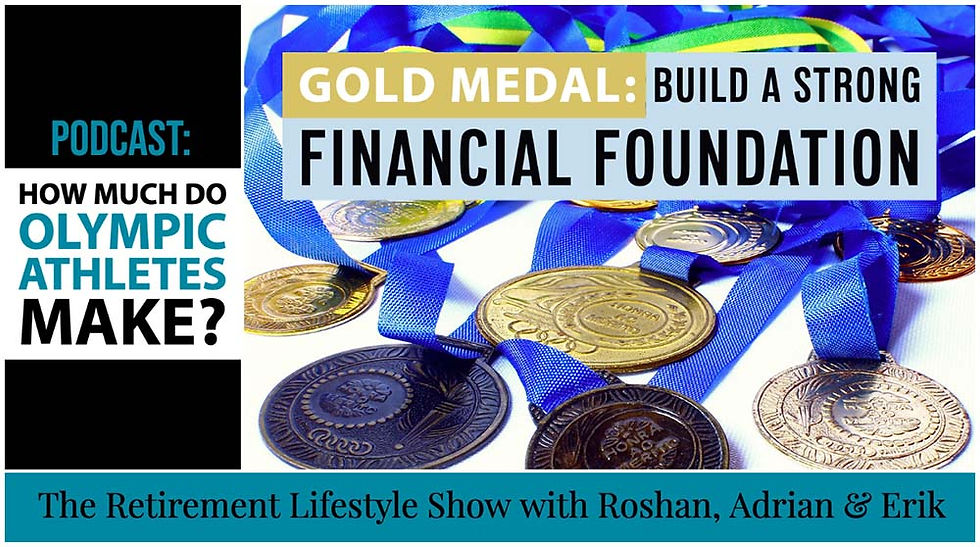How much do Olympic athletes make?
- roshanloungani
- Aug 12, 2021
- 3 min read
RL077 - Retirement Lifestyle: How much do Olympic athletes make?
Today on the Retirement Lifestyle Show, Roshan Loungani and Adrian Nicholson talk about Olympic athletes and their finances. They expound on the countries that pay the most for Olympic gold, financial advice for Olympic athletes, and why financially literate people seem to maintain their wealth effortlessly.
[04:50] Which Countries Pay the Most for Olympic Gold?
[12:15] Financial Planning for Professional Olympic Athletes
[26:40] Key Differences Between the Affluent and the Wealthy
[31:05] Why Only the Financially Literate People can be Wealthy
[37:35] Olympic Athletes who Have Unique Side-Hustles
[38:30] Top Ten Richest Olympians
For more links and the full show notes keep scrolling down!
Roshan Loungani can be reached at roshan.loungani@aretewealth.com or at 202-536-4468.
Erik Olson can be reached at erik.olson@aretewealth.com or 815-940-4652.
Adrian Nicholson can be reached at adrian.nicholson@aretewealth.com or at 703-915-8905.
For links to your favorite platform like Spotify, iTunes and so on go here:
Select episodes, like this one, can be found on YouTube:

Follow Us At:
https://www.retirementlifestyleshow.com https://www.retirewithroshan.com https://youtu.be/hKVzI87v0tA https://twitter.com/RoshanLoungani https://www.linkedin.com/in/roshanloungani/ https://www.facebook.com/retirewithroshan/ https://www.linkedin.com/in/financialerik/ https://www.linkedin.com/in/adrian-nicholson-74b82b13b/ #retirementlifestylepodcast #fire #podcast #FI #Retire #retirewithroshan
Full Show Notes:
Which Countries Pay the Most for Olympic Gold?
Although the Olympic Committee does not offer monetary rewards to medalists, many countries pay prize money to winning athletes. For example, the US pays $37,500 for gold, $22,500 for silver, and $15,000 for bronze. US athletes also receive other benefits such as college tuition assistance, health insurance, and access to top-tier medical facilities. On the other hand, Singapore rewards its gold medalists 1 million Singapore dollars, comparable to $737,000. Interestingly, several nations such as Great Britain, Sweden, and New Zealand do not offer prize money for Olympic medals.
For the most part, people hit their peak earning years in their 50s. This statistic holds for most people, whether in business or employment. However, athletes hit their prime earning years in their 20s or early 30s. So, how can these athletes guarantee that their money lasts them an entire lifetime, all the way into retirement? Not all Olympic athletes receive million-dollar sponsorship deals that supplement their income. Some have to work regular jobs or find other forms of income. And the fact that athletes can’t perform at the top level for more than 20 years makes financial planning all the more critical.
Financial Planning for Professional Olympic Athletes
With some Olympic athletes earning six to seven figures in prize money and salaries, financial planning is necessary. Athletes in their prime can make, in a few years, what the average worker may not see in a lifetime. Unfortunately, this often gives a false sense of security. The huge earnings give way to consequential financial mistakes such as buying too many cars, purchasing more houses than they need, and not saving for the future. A compounding factor is that athletes tend to be young when they suddenly find themselves with plenty of money. So, what are some of the generative things Olympic athletes can do with monetary rewards from the Olympics?
Retirement Planning
The average earning per year for most top-tier Olympic athletes is $100,000. As a 20-year-old athlete, you might be thinking that retirement is too far away to start planning for it. But remember, you won’t enjoy your peak years for the rest of your life. So, it would be best if you set up a retirement plan to secure your future and enjoy the tax benefits that come with it.
Save for College
The mean age for gymnasts at the Tokyo Olympics is 22. This means that most competitors are in or yet to join college. As an athlete averaging $100,000 a year, maybe some of that money should be set aside to fund your education.
Reevaluate your Investments
As a 20-year-old athlete, you might be young enough to take risks and invest in volatile investment options. Or old enough to start managing risks in your portfolio. And if you don’t have an active portfolio, maybe it’s time to set one up.
Star an Entrepreneurial Venture
As earlier mentioned, some athletes have to work full or part-time to supplement their Olympic earnings. And investing earnings in a business is one the most efficient things an athlete can do with their money.
Training
Preparing for the Olympics is expensive. Athletes have to buy training gear, pay for top-tier medicare, and train with the best coaches. All these require money.
Get Into Good Habits
The sooner an athlete starts saving, the better. Getting into good habits early will guarantee a safer future, as numerous uncontrollable variables can impact an athlete’s career.
All opinions expressed by podcast hosts and guests are solely their own. While based on information that they believe is reliable, neither Arete Wealth nor its affiliates warrant its completeness or accuracy, nor do their opinions reflect the opinion of Arete Wealth. This podcast is for general informational purposes only, and should not be regarded as specific advice or recommendations for any individual. Before making any decisions, consult a professional.





Comments